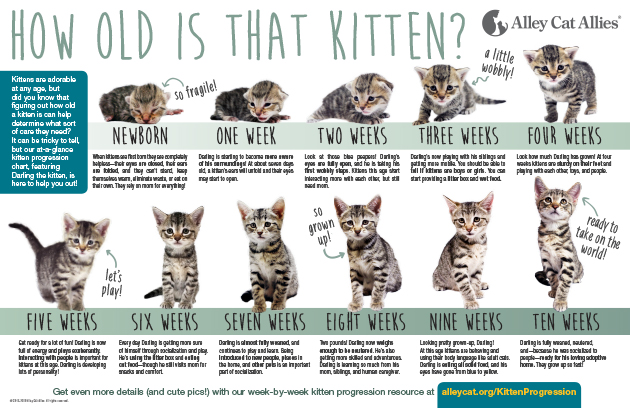Kitten development in the first few weeks of life is truly fascinating. These early stages are crucial for their growth and behavior.
In the first weeks, kittens undergo rapid changes. Their senses sharpen, and they start exploring the world. This period is vital for their physical and mental health. Understanding these stages can help you provide the best care for your little furball.
From opening their eyes to taking their first steps, every moment is a milestone. This blog will guide you through the key developments and what to expect during this tender time. Get ready to learn about the amazing journey of kittens in their early weeks.
:strip_icc()/kitten-development-first-six-weeks-555170_05-5b1700c6fa6bcc00369a1fa4.png)
Credit: www.thesprucepets.com
Birth And Initial Adaptation
The journey of a kitten’s life begins with the remarkable process of birth and the first steps of adaptation. These early moments are crucial as they lay the foundation for a kitten’s growth and development. Let’s dive into the magical world of kitten development, starting with their birth and initial adaptation.
First Breath
When a kitten is born, its first breath is a momentous occasion. It’s like the kitten’s first hello to the world. Upon birth, the kitten’s lungs fill with air for the first time. This process is vital as it kickstarts the kitten’s respiratory system. Sometimes, the mother cat may gently lick her kittens to stimulate their breathing. Isn’t it amazing how nature takes care of its own?
Nursing And Bonding
Once the kittens have taken their first breaths, the next critical step is nursing. The mother’s milk is not just food; it’s a powerful cocktail of nutrients and antibodies. This helps strengthen the kittens’ immune system. The kittens instinctively find their way to their mother’s nipples, guided by their sense of smell.
During this time, the bond between the mother and her kittens starts to form. This bond is essential for the kittens’ emotional and physical well-being. The mother cat’s warmth and presence provide comfort and security to the newborns. Just like a baby’s first cuddle, these moments are irreplaceable.
Here’s a simple breakdown of the nursing and bonding process:
- Instinctive Crawling: Kittens use their sense of smell to find their mother’s nipples.
- Milk Supply: The mother’s milk provides essential nutrients and antibodies.
- Bond Formation: The physical closeness fosters a strong bond between the mother and her kittens.
Observing this process can be heartwarming. It’s a reminder of the natural instincts that guide these tiny creatures from the very start.
The first few weeks of a kitten’s life are filled with rapid changes and crucial milestones. By understanding these early stages, we can better appreciate the wonder and resilience of these furry little beings. Stay tuned for more insights into the fascinating world of kitten development!

Credit: www.alleycat.org
Week One: Rapid Changes
Welcoming a kitten into your home is an exciting experience. The first week of a kitten’s life is a period of rapid changes and critical development. During this time, kittens undergo significant transformations that set the foundation for their growth and health. Let’s dive into the fascinating journey of a kitten’s first week, focusing on weight gain and their developing sense of touch.
Weight Gain
From the moment they are born, kittens start growing at an impressive rate. Typically, a newborn kitten weighs between 85 to 115 grams. By the end of the first week, they can double their birth weight. It’s quite a sight to see these tiny furballs growing so quickly!
Here’s a simple breakdown of their weight gain progress:
| Day | Weight |
|---|---|
| Day 1 | 85-115 grams |
| Day 3 | 100-150 grams |
| Day 7 | 150-230 grams |
Keeping track of their weight is crucial. It ensures they are getting enough nutrition from their mother’s milk. If you notice any significant deviations, it might be time to consult a vet. But generally, as long as they are gaining weight steadily, you can breathe easy. Watching their little tummies round out is a joy, isn’t it?
Sense Of Touch
One of the earliest senses to develop in kittens is their sense of touch. Even though their eyes are closed and their ears are folded at birth, their little paws are already exploring their surroundings. This sense helps them find their mother and siblings, ensuring they stay warm and fed.
Here’s what you might observe:
- Paw Reflexes: When you gently touch a kitten’s paw, they may curl it up. This reflex is a sign of their developing nervous system.
- Nuzzling: Kittens use their sense of touch to nuzzle into their mother’s fur. It’s adorable and essential for their bonding and feeding.
- Warmth Seeking: Newborns instinctively seek out warmth. If you place your hand near them, they might snuggle up for comfort.
It’s amazing how much they rely on touch during these early days. Each touch and nuzzle helps them grow stronger and more connected to their world. Isn’t it heartwarming to see such tiny creatures already so full of life?
As you watch your kitten grow, remember that these rapid changes in the first week are just the beginning. Each milestone is a step towards them becoming a playful and loving companion. So, cherish every moment and be amazed by the wonder of kitten development.
Week Two: Eyes And Ears
Welcome back to our guide on kitten development! During the second week of life, your tiny furball experiences significant changes. This week, we focus on their eyes and ears. These senses begin to develop, opening up a whole new world for your kitten. Let’s dive into the specifics of these exciting changes.
Eye Opening
In the second week, kittens start to open their eyes. This usually happens between 7 to 10 days after birth. The process is gradual. You might see one eye open before the other, or just a tiny slit at first. Don’t worry, this is normal. By the end of week two, most kittens will have their eyes fully open.
Their eyes are typically blue at this stage. This is because their eyes lack pigment initially. The true color will develop over the next few weeks. It’s important to remember that kittens’ eyes are very sensitive to light. So, keep their environment dim and calm.
Hearing Development
While their eyes are opening, their ears are also going through changes. Kittens are born with their ears folded and closed. Around the same time their eyes start to open, their ears begin to unfold. This allows them to start hearing sounds around them.
By the end of the second week, their hearing becomes more acute. They may start to respond to your voice or other noises in their environment. It’s a good idea to speak softly and avoid loud noises. This helps them feel safe and secure during this sensitive period.
During this time, you can gently introduce them to the sounds of everyday life. Soft music, quiet conversations, and the hum of household appliances can help them get used to their new world.
To sum up, week two is a significant time for your kitten’s sensory development. With their eyes and ears opening up, they are starting to experience the world in a whole new way. These milestones are crucial for their growth, so enjoy watching them explore and discover!
Week Three: Mobility Begins
Welcome to the magical journey of kittenhood! In the blink of an eye, your tiny feline friends are growing and developing at an astounding rate. By the third week, kittens experience a significant milestone: mobility. This is a time of great excitement, both for you and the little furballs. Let’s dive into what happens during this thrilling phase.
First Steps
During the third week of life, kittens begin to take their first wobbly steps. Imagine a toddler learning to walk – it’s just as adorable and heartwarming! Their legs are still a bit shaky, but with each step, they become more confident. They might stumble and fall, but that’s part of the learning process.
Their muscles are getting stronger, and their coordination is improving. You’ll notice them trying to stand up more often. They might not venture far from their cozy nest just yet, but these first steps are crucial. It’s the beginning of their journey to becoming agile and playful cats.
Exploratory Behavior
As kittens gain confidence in their mobility, their curiosity also spikes. They start exploring their surroundings, albeit cautiously. Everything is new and fascinating – from the texture of a blanket to the sound of a crinkly toy. This is an important phase for sensory development.
During this time, you might see them using their tiny paws to bat at objects, testing their environment. They might also start interacting with their littermates in more dynamic ways, such as gentle wrestling or playful pouncing. These activities are not only fun but also essential for their social skills.
Here’s a quick table to summarize their developmental milestones during the third week:
| Milestone | Description |
|---|---|
| First Steps | Wobbly and unsteady, but improving daily. |
| Exploratory Behavior | Increased curiosity and sensory exploration. |
| Social Interaction | More playful interactions with littermates. |
Isn’t it incredible to watch them grow and learn? Every little move they make is a step closer to becoming the graceful cats they will soon be. So, enjoy every moment and be ready to capture these precious memories. After all, they grow up so fast!
Week Four: Socialization
Welcome to the fourth week of your kitten’s life! This is a crucial time for your furry friend. Socialization during this period helps shape their behavior and interactions for the rest of their lives. It’s amazing to see how much they grow and learn in such a short span. Let’s dive into what happens during this exciting week.
Interaction With Siblings
During the fourth week, kittens start to explore their surroundings more. They become more playful and start interacting with their siblings. This interaction is vital as it teaches them important social skills. Through wrestling, chasing, and even gentle biting, they learn how to communicate and play nicely.
- Play Fighting: Kittens engage in play fights to practice hunting skills and learn boundaries.
- Grooming: They start grooming each other, which strengthens their bond.
Watching kittens interact is both entertaining and educational. It’s like a mini soap opera unfolding right before your eyes!
Human Interaction
Human interaction is just as important as sibling interaction. At this stage, kittens should be gently handled by humans. This helps them get used to human touch and presence. Here are some tips for interacting with your kitten:
- Gentle Handling: Always handle your kitten gently and speak softly to avoid frightening them.
- Short Sessions: Keep the interaction sessions short to not overwhelm the kitten.
- Introduce Toys: Use toys to encourage play and interaction.
By interacting with your kitten, you’re helping them develop trust and a sense of security around humans. This will make them more affectionate and friendly as they grow.
Week four is indeed a time of discovery and fun for your kitten. Enjoy every moment and watch as they grow into confident and sociable cats!
Week Five: Play And Learning
Week five is a significant stage in a kitten’s development. During this period, kittens start to show more playful behavior. They also begin to learn essential skills for survival. This week is vital for their growth and learning. Let’s explore their playful behavior and their budding hunting skills.
Playful Behavior
At week five, kittens are full of energy. They love to explore their surroundings. They engage in playful activities like chasing their tails. They also enjoy pouncing on their siblings. These activities help them develop their motor skills. Playful behavior strengthens their muscles. It also helps them learn social skills. They learn how to interact with other cats. Play helps them understand boundaries. They learn what is acceptable and what is not.
Learning To Hunt
Kittens start to show their hunting instincts in week five. They practice stalking and pouncing. They might pounce on toys or their littermates. These actions are part of their natural hunting behavior. They learn to coordinate their movements. They practice catching and holding objects. This is crucial for their survival in the wild. Learning to hunt is an instinctive behavior. It prepares them for adult life. It ensures they can find food when needed. Observing their hunting play is fascinating. It shows their natural instincts at work.
Week Six: Independence
As kittens reach their sixth week, they begin to show more independence. This is a critical period in their development where they start exploring their surroundings more confidently. During this time, kittens begin to eat solid food and learn to use the litter box. Let’s dive deeper into these exciting milestones.
Weaning Process
By week six, kittens are ready to transition from their mother’s milk to solid food. This process, known as weaning, is essential for their growth and development. Weaning typically begins around the fourth week and continues until kittens are fully independent of their mother’s milk.
- Introducing Solid Food: Start by offering a mixture of wet kitten food and warm water to create a soft, gruel-like texture. Gradually reduce the amount of water as the kittens get used to the new food.
- Frequency of Feeding: Kittens have small stomachs and need to eat several times a day. Aim for four to six small meals daily.
- Monitoring Progress: Ensure each kitten is eating well and gaining weight. If a kitten struggles with the transition, offer additional support or consult a veterinarian.
Litter Training
Litter training is another significant milestone for kittens during their sixth week. Most kittens learn quickly, but patience and consistency are key.
- Choosing the Right Litter Box: Select a small, shallow litter box that is easy for kittens to access. Avoid covered boxes as they might intimidate young kittens.
- Introducing the Litter Box: Place the kitten in the litter box after meals and naps. Gently scratch the litter with their paws to demonstrate the desired behavior.
- Positive Reinforcement: Praise and reward your kitten with treats or affection when they use the litter box correctly. Avoid punishment as it can create fear and confusion.
- Maintaining Cleanliness: Keep the litter box clean by scooping it daily and changing the litter regularly to ensure a hygienic environment.
Week six is an exciting time for both kittens and their caregivers. By focusing on the weaning process and litter training, you can help your kitten develop the skills they need to become healthy and independent. Remember to be patient and enjoy this special phase of their growth!

Credit: dailyinfographic.com
Week Seven To Eight: Preparing For Adoption
As your little furballs approach the seven to eight-week mark, they are almost ready to find their forever homes. This period is crucial for their development, as they learn essential social and survival skills. Let’s dive into what you need to know to prepare these kittens for adoption, including health check-ups and ensuring they are truly adoption-ready.
Health Check-ups
Before the kittens are ready to leave for their new homes, a thorough health check-up is a must. Think of it as their final exam before graduation!
- Vaccinations: Ensure they have received their first set of vaccinations. This is crucial to protect them from common feline diseases.
- Parasite Control: Check for fleas, ticks, and worms. These tiny pests can cause big problems if left untreated.
- Overall Health: A vet will examine their eyes, ears, teeth, and overall physical condition. Healthy kittens are happy kittens!
It’s not just about the physical health, though. Pay attention to their behavior. Are they active and playful? Do they respond well to human interaction? These are good signs that they are healthy and ready to move to their new homes.
Adoption Readiness
Now, let’s talk about what it takes to make sure your kittens are truly prepared for adoption. Here are some key points to consider:
- Socialization: By this age, kittens should be well-socialized. This means they are comfortable around humans and other animals. They should be familiar with common household sounds and not easily startled.
- Litter Training: Make sure they are fully litter trained. No one wants to bring home a kitten that isn’t using the litter box!
- Weaning: Kittens should be completely weaned off their mother’s milk and eating solid kitten food. This ensures they are nutritionally ready to move on.
- Basic Manners: Kittens should know not to bite or scratch during play. Gentle handling and positive reinforcement help a lot here.
Remember, each kitten is unique. Some may be ready a bit earlier, while others may need a little more time. It’s important to judge each kitten individually.
As you prepare these kittens for adoption, think about their future families. What can you do to make the transition smoother for both the kitten and their new owners? Providing a small blanket or toy that smells like their mother can be a comforting touch.
So, are you ready to send these little ones off to their new adventures? With a bit of care and attention, they’ll be ready to steal hearts in no time!
Frequently Asked Questions
What Do Kittens Start Doing At 3 Weeks?
At 3 weeks, kittens start exploring their surroundings and developing coordination. They begin to walk and play actively.
What Should A 1 Week Old Kitten Be Doing?
A 1-week-old kitten should be nursing frequently, sleeping a lot, and being kept warm. They can crawl and seek warmth.
What Do Kittens Develop At 4 Weeks?
At 4 weeks, kittens develop their sense of hearing and vision. They start walking and socializing with littermates.
What Is The Hardest Age For A Kitten?
The hardest age for a kitten is between 2 to 7 weeks. During this period, they are most vulnerable and require constant care.
Conclusion
Kittens grow rapidly in their first few weeks. These early stages are crucial. Proper care ensures healthy development. Bond with your kitten daily. Provide a safe, warm environment. Monitor their weight and eating habits. Consult a vet for any concerns.
Enjoy watching your kitten explore and learn. Their playful nature brings joy and laughter. Your love and attention make a big difference. Embrace this special time with your new furry friend.




